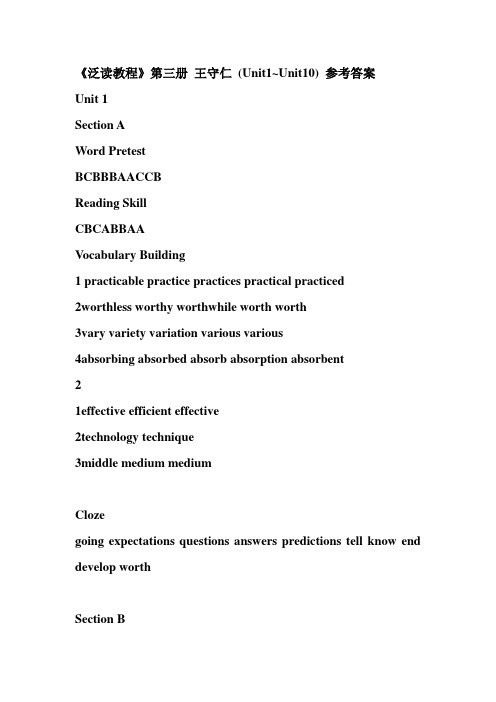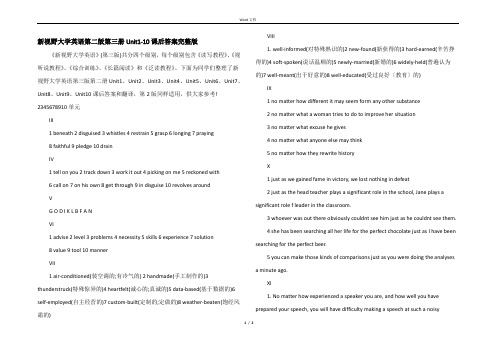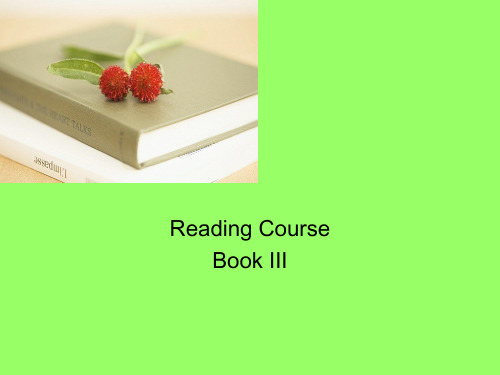泛读教程第二版第三册unit 1
unit1英语泛读教程第三版第二册第一单元

unit1英语泛读教程第三版第二册第一单元该课件简单明了,帮助学生很好的掌握课文结构,拓展词汇Unit 1 The Shadowland of Dreamsby Alex Haley该课件简单明了,帮助学生很好的掌握课文结构,拓展词汇Outline Preview Questions Background Information Structure Vocabulary Discussion该课件简单明了,帮助学生很好的掌握课文结构,拓展词汇Preview Questions 1. What is your dream? To be more specific, what is your dream career? What is your dream life? 2. What will you do to achieve your dream?该课件简单明了,帮助学生很好的掌握课文结构,拓展词汇Background Information Alex Haley (August 11, 1921 C February 10, 1992) was an American writer. He is best known as the author of Roots: The Saga of an American Family and the coauthor of The Autobiography of Malcolm X.该课件简单明了,帮助学生很好的掌握课文结构,拓展词汇Roots: The Saga of an American Family is a novel written by Alex Haley and first published in 1976. It tells the story of KuntaKinte, an 18th-century African, captured as an adolescent and sold into slavery in the United States, and follows his life and the lives of his alleged descendants in the U.S. down to Haley.该课件简单明了,帮助学生很好的掌握课文结构,拓展词汇The release of the novel, combined with its hugely popular television adaptation, Roots (1977), led to a cultural sensation in the United States. The novel spent weeks on The New York Times Best Seller List, including 22 weeks in that list's top spot.该课件简单明了,帮助学生很好的掌握课文结构,拓展词汇The last seven chapters of the novel were later adapted in the form of a second miniseries, Roots: The Next Generations, in 1979.该课件简单明了,帮助学生很好的掌握课文结构,拓展词汇Structure AnalysisPart One (para. 1-2) : There is a big difference between “being a writer”and writing. Part Two (para. 3-14) : Alex cited himself as a good example to prove that writing career is tough and suffering test. Part Three (para. 15- 18) : As he kept working at his dream, Alex eventually achieved success. Part Four (para. 19-23) : His old possession reminds him of the courage and persistence which help him endure in the shadowland.该课件简单明了,帮助学生很好的掌握课文结构,拓展词汇Vocabulary requite: reward or avenge requite hate with love 以德报怨freelance:self-employed prospect: an expectation, esp. of success in a career该课件简单明了,帮助学生很好的掌握课文结构,拓展词汇superintendent: the caretaker of a building manual: worked by hand manual labour 体力劳动该课件简单明了,帮助学生很好的掌握课文结构,拓展词汇genuine: used to describe people and things that are exactly what they appear to be, and are not false or an imitation refers to things such as emotions that are real and not pretended 该课件简单明了,帮助学生很好的掌握课文结构,拓展词汇tempt: allure or attract acquaintance: a person who knows slightly make one's acquaintance (初次)结识某人make the acquaintance of 初次认识acquaint v. make familiar with 该课件简单明了,帮助学生很好的掌握课文结构,拓展词汇well up : flow or get stronger Anger well up within him.他怒火中烧。
泛读教程 第三册 cloze 答案 原文【范本模板】

Unit1。
The ability to predict what the writer is going/ about/ trying to say next is both an aid to understanding and a sign of it。
A prediction begins from the moment you read the title and from expectations of what he book is likely to contain. Even if the expectations/predictions are contradicted, they are useful because they have started you thinking about the topic and made you actively involved.If you formulate your predictions as questions which you think the text may answer,you are preparing yourself to read for a purpose: to see which of your questions are in fact dealt with and what answers are offered。
If your reading is more purposeful you are likely to understand better。
Naturally your predictions/expectations will not always be correct。
This does not matter at all as long as you recognize when they are wrong, and why. In fact mistaken predictions can tell you the source of misunderstanding and help you to avoid certain false assumptions。
《泛读教程》_第三册(Unit1~Unit10)

《泛读教程》第三册王守仁(Unit1~Unit10) 参考答案Unit 1Section AWord PretestBCBBBAACCBReading SkillCBCABBAAVocabulary Building1 practicable practice practices practical practiced2worthless worthy worthwhile worth worth3vary variety variation various various4absorbing absorbed absorb absorption absorbent21effective efficient effective2technology technique3middle medium mediumClozegoing expectations questions answers predictions tell know end develop worthSection BTFTT CBCC TFF CAACCASection CFFTFFTTTUnit 2Section AWord PretestABACCABABCCReading SkillCBB FTFFTTVocabulary Building11mess 2preference 3aimlessly 4remarkable 5decisive 6shipment 7fiery 8physically 9action 10housing21aptitude attitude2account counted counted3talent intelligenceClozeother just has some than refuse see that without if ready wrongSection BACCCCCCCACBABASection CCCDDACUnit 3Section AWord PretestABCCBDCDCReading SkillBABCAACBCVocabulary Building1Admission admit admissible admissiblyReliance rely reliable reliablyDefinition define definite definitelyAssumption assume assumed assumedlyBehavior behave behavioral behaviorallyVariety vary various variouslyPart part partial partiallyManager manage managerial manageriallyCorrelation correlate correlative correlativelyAdaptation adapt adaptive adaptively21inspired aspired inspired2token badges token3contemporaries temporary contemporaryClozeCommunicate ways using in of message meet causes meaning to eyesSection BBABBAC FFTTTF CCBSection CBBDDBCCA FFTFFTUnit 4Section AWord PretestCACAABBBCCReading SkillBBACBCCAAVocabulary Building11moist 2betrayal 3exclusively 4inhumane 5amazed 6endangered 7marvels 8deadly21dessert deserted2favourite favorable favorable3awarded reward awardedClozeParents idea at seen landmarks instance migrate guide pole effect it if experimentsSection BCCB FTF BCACCBACCSection CFFTFFFTTFTUnit 5Section AWord PretestCAABCACCCReading SkillCABCB FFTFTTVocabulary Building1Assumption assume assumed assumedly Acknowledgement acknowledge acknowledgedly Reflection reflect reflective reflectively Domination dominate dominant dominantly Category categorize categorical categoricallyImplication imply implicative implicativelyReassurance reassure reassuring reassuringlyDefinition define definite definitely21historical historic2rejected resist3test analyzedClozeExisted over head body found language use single passed ahead survival handlingSection BCABCBB TTTFTT CACSection CBBAAACBCUnit 6Section AWord PretestC ACBABACABABReading SkillCAACACCAVocabulary BuildingAvailability avail available availablyConquest conquer conquering conqueringlyLuxury luxuriate luxurious luxuriouslyOrgin orginate original originallyOccurrence occur occurrentSystem systematize systematical systematicallyPhonology (这个是没有动词形式的)phonological phonologicallyDecision decide decided decidedlyVariety vary various variouslySuperiority (这个是没有动词形式的)superior superiorlyPeculiar particular particularAssess access accessResources source sourcesClozeSex men differs compliment complimenting causes makes languages have outside understood have use circleSection BCBBBACBCCCCBACCBASection CBBCABBACCBUnit 7Section AWord PretestABABCBACReading SkillBBBCCBCBVocabulary BuildingDeduced behavior adhere replacement option delicacy enormous pursuitInquired required inquire requiredCompatible comparable compatible comparableClozeSatellite some space asked life sort orbiting have living were believe own solar where likely living throughSection BFTFFTTTTTFFFBBCACCSection CBCBCCAEDEBAFDCUnit 8Section AWord PretestBCABCBBCCAReading SkillCBABCBCCCCVocabulary BuildingOccupation occupy occupational occupationallySegregation segregate segregated(这个没有副词)Discrimination discriminate discriminating discriminatingly Enforcement enforce enforceable enforceablyExclusion exclude exclusive exclusivelyPerseverance persevere persevering perseveringlyConviction convict convictive convectivelyAmendment amend amendable(这个没有副词)Superficiality superficialize superficial superficially Spectator spectate spectatorial (这个没有副词)Job career jobs careerPrincipal principles principal principleFeminine female feminineClozeAcceptable domestic property wages husband divorce claims legal suit permitted make excluded lacked belonged determined Section BBACCCCACCCAABBACTTFSection CCCAACBUnit 9Section AWord PretestBAABCACBBABCReading SkillCACCBBBBBACBVocabulary BuildingTypifies dominant familial competitive vibrate descended departure boom countless symbolizesRecreation recreates recreationRhythm rhyme rhymes rhythmClozeSea within of divides built celebrated inside attract together whenSection BFTFTTCCBBCBAACCACSection CBAACABCCCCUnit 10Section AWord PretestCABCBBBBABReading SkillCBCACCCABBVocabulary BuildingConsequence(这个没有动词形式)consequent consequently Sophistication sophisticate sophisticated sophisticatedly Reference refer referable referablyConversation converse conversational conversationally Space space spatial spatiallyDetachment detach detachable detachablyIntervention intervene intervening(这个没有副词)Type typify typical typicallyAssure ensure assured ensureArises raised rise raised arisenClue cues clue cueClozeWell separating is own close need look order respect follow prior sign help was elseSection BBBCTTFBCACACTFFSection CTFFTFFFF。
泛读教程(三)课后题答案(Unit 1-15)

《泛读教程》第三册课后题答案Unit1Section AVocabulary Building:I.1.practical,practice,practices,practical,practiced2.worthless,worthy,worthwhile,worth,worth3.vary,variety,variation,various,Various4.absorbing,absorbed,absorb,absorption,absorbentII.1.effective,efficient,effective2.technology,technique3.middle,medium,mediumClozeGoing/about/trying,expectations/predictions,questions,answers,predictions/expectations,tell, know/foretell,end,develop/present,worthSection BTFTT,CBCC,TFF,CAA,CCAUnit2Section AVocabulary Building:I.mess,preference,aimlessly,remarkable,decisive,shipment,fiery,physically,action,housing II.1.aptitude,attitude2.account,counted,counted3.talent,intelligenceClozeOther,just/only,has,some/many,than,refuse,see/know/understand,that,without,If, ready/willing/educated/taught,wrong/incorrect/erroneousSection BACC,CC,CCC,ACB,ABASection CCCDDACUnit3Section AVocabulary Building:I.Noun Verb Adjective Adverbadmission admit admissible Admissiblyreliance rely reliable Reliablydefinition define definite Definitely assumption assume assumed/assuming Assumedly/assumingly behavior Behave behavioral Behaviorallyvariety Vary Various/varied Variously/variedly Part/partiality Part partial Partiallymanager manage managerial Managerially correlation correlate correlative Correlatively Adaptation adapt adaptive adaptivelyII.1.inspired,aspired,inspired2.token,badges,token3.contemporaries,temporary,contemporaryClozeCommunicate,ways/means/ones,using/saying,in,of,message,meet/have/encounter/experience, causes,meaning,to,eyesSection BBAB,BAC,FFT,TTF,CCBSection CBBDDBCCAFFTFFTUnit4Section AReading Skill:Skimming2-10BBAC BCCAAVocabulary Building:I.moist,betrayal,exclusively,inhumane,amazed/amazing,endangered,marvels,deadlyII.1.dessert,deserted2.favorite,favorable,favorable3.awarded,reward,awardedClozeParents,idea,at/by,seen,landmarks,instance/example,migrate,guide/direct,pole,effect/ influence,It/This,if/whether,experimentsSection BCCB FTF BCA CCB ACCSection CFFTFF FTTFFUnit5Section AVocabulary Building:I.Noun Verb Adjective Adverbassumption assume assumed/assuming assumedly/assumingly acknowledgement acknowledge acknowledged acknowledgedly reflection reflect reflective reflectively domination dominate dominant dominantlycategory categorize categorical categorically implication imply implicative implicatively reassurance reassure reassuring reassuringly definition define definite definitelyII.1.Historical,historic2.rejected,resist3.test/analyze,analyzedClozeExisted/appeared,ever,head/brain,body,found,language,use/value/significance/importance, single,passed,ahead,survival/existence,handling/overcomingSection BCAB CBB TTT FTT CACSection CBBAA ACBCUnit6Section AWord Pretest:CACBA BACAB ABVocabulary Building:I.availability avail available Availablyconquest conquer Conquering/Conqueringlyconqueredluxury luxuriate luxurious Luxuriouslyorigin originate original Originally occurrence occur Occurrentsystem systematize Systematical/Systematicallysystematicphonology phonological Phonologicallydecision decide Decided/decisive Decidedly/decisively variety vary various Variously superiority superior SuperiorlyII.1.peculiar,particular,particular2.assess,access,access3.resources,source,sourcesClozeSex,Men,differs,compliment/words,complimenting,causes,makes,languages,have,outside, understood,have,use,circle/world/fieldSection BCBBBA CBCCC CBACC BASection CBBCAB BACCBUnit7Section AWord PretestABABC BACVocabulary Building:I.deduced,behavior,adhere,replacement,option,delicacy,enormous,pursuitII.1.inquired,required,inquire,requiredpatible,comparable,compatible,comparableClozeSatellite,some,space,asked/wondered,life,sort/kind,orbiting/going/circling,have,living, were,believe,own,solar,where,likely,living,throughSection BFTFFT TTTTF FFBBC ACCSection CBCBCC AEDEBAFDCUnit8Section AVocabulary Building:1.occupataion,occupy,occupational,occupationallysegregation,segregate,segregateddiscrimination,discriminate,discriminating/discriminatory,discriminatingly/discriminatorily enforcement,enforce,enforceable,enforceablyexclusion,exclude,exclusive,exclusivelyperseverance,persevere,persevering,perseveringlyconviction,convict,convictive,convictivelyamendment,amend,amendablesuperficiality,superficialize,superficial,superficiallyspectator,spectate,spectatorial2.1.a.job b.career c.jobs d.career2.a..principal b.principles c.principal d.principle3.a.feminien b.female c.feminineClozeAcceptable,domestic,property,wages,husband,divorce,claims,legal,suit,permitted,make, excluded,lacked,belonged,determinedSection BBACCB CACCC AABBA C TTFSection CCCAACBUnit9Section AVocabulary Building:1.1.typifies2.dominant3.familialpetitive5.vibrate6.descended7.departure8.boom9.countless10.symbolizes2.1.a.recreative b.recreates c.recreation2.a.rhythm b.rhyme c.rhymes d.rhythmClozeSea,within,of,divides,built/constructed/completed,celebrated,inside/in,attract,together,whenSection BFTFTT CCBBC BAACC ACSection CBAACA BCCCCUnit10Section AVocabulary Building:1.consequence,,consequent/consequential,consequently/consequentially sophisticatiion,sophisticate,sophisticated,sophisticatedlyreference,refer,referable,referablyconversation,converse,conversational,conversationallyspace,space,spatial/spacious,spatially/spaciouslydetachment,detach,detachable/detached,detachably/detachedlyintervention,intervene,interveningtype,typify,typical,typically2.1.assure,ensure,assured,ensure2.arises,raised,rise,raised,arisen3.clue,cues,clue,cueClozeWell,separating/isolating,is,own,close,need,look,order,respect,follow,prior,sign/cue,help, was/were,elseSection BBBC TTF BCA CAC TFFSection CTFFTF FFFUnit11Section AVocabulary Building:1.information,inform,informative,informativelyspecification,specify,specific,specificallyaddition,add,additional/additive,additionally/additivelyspecialty,specialize,special,speciallynarration,narrate,narrative,narrativelyextension,extend,exxtensive,extensivelyorigin,originate,original,originallyexplosion,explode,explosive,explosivelyambiguity,,ambiguous,ambiguouslyestablishment,establish,established1.extension2.mabiguity3.orignal4.specified5.additional6.unambiguously7.explosionrmation9.specialized10.narrative11.establishment2.1.transform,transferred,transferred,transformed2.lonely,alone,lonely,aloneClozeLibrary,amounted,own,burned/destroyed,countries’,send,suggestion/proposal,librarySection BACBCB ACCAC ABABB ABSection CBCACC CBCCCUnit12Section AVocabulary Building:1.reaction,mass,polluting,planetary,suspicious,alarming,emitted,emerged2.1.warned,threatened2.spread,spread,sprayed3.emergency,emergenceClozeSolve,communities,creative,prevention,disposal,resources,recycloing,waste,increase,place, measures,amountSection BFFTT BCAC FTFF ABC CBCSection CBCAAC CBCUnit13Section AVocabulary Building:1.symptom,symptomize,symptomatic,symptomaticallylonging,long,longing,longinglyaddition,add,additional additive,additionally/additivelymanifestation,manifest,manifest,manifestlydepression,depress,depressed/depressing,depressedly/depressinglyinvariability,,invariable,invariablyseparation,separate,separate,separatelycondemnation,condemn,condemnable,condemnablyimagination,imagine,imaginary,imaginarilyaffection,affect,affecting,afeectingly2.1.remedies,recipe,remedy,recipe2.alternate,altered,alternate,alter3.acknowledged,knowledge,acknowledgedClozeStep,acknowledge,prevent,essential,physician,due,physical,psychosomatic,disease, confidence,symptoms,thorough,emotional,upsettingSection BCBCAB CBBCB ABCACSection CTFFFT FTFFFUnit14Section AVocabulary Building:1.reluctant,evolution,atrributed,catastrophic,assoicate,indifferent,emerged,stir2.1.evolved,revolved,evolved2.dismay,dismal,dismal,dismay3.contribute,attributed,contributed,attributedClozeCharacteristic/trait/nature,changed/had,to,long,get/eat,possessed/developed/had,stretched /lengthened,longer,passed,After,have,theory,effect/influence,notion/idea,changeSection BDAB FTFTF DAD BAC FTFSection CTFTFT FTFUnit15Section AVocabulary Building:1.Prevention,prevent,preventive,preventivelyFederation,federate,federal,federallyInadequacy,,inadequate,inadequatelyDeception,deceive,deceptive,deceptivelyProsperity,prosper,prosperous,prosperouslyLife,live,live/living/aliveEffect,effect,effective,effectivelyEvaluation,evaluate,evaluable/evaluativeResident,reside,residential,residentiallyVision,vision,visional/visionary,visionally/visionarity1.evaluabtion,2.federal3.prosperity4.residential5.effect6.are living7.deceptively8. preventive/effective2.1.simile,metaphor2.ultimate,unanimous,ultimate,unanimousClozeTransportation,distance/away,ground,Steam,trains,electric,station/stop,name,train,three, trains,stairs/steps,passengers/peopleSection BDCDCC CCCAB CBSection CCCACC CCC。
完整英语课文翻译 泛读教程2第三版(刘乃银)

第一单元:梦想的阴暗之面艾力克斯? 哈利许多人怀有美好的愿望,期望能成为作家,但是能够梦想成真的人不多。
艾力克斯? 哈利也想成为作家,可是他成功了。
阅读下面这篇文章,看一看他成功的原因。
许多青年人对我说,他们想成为作家。
我一直鼓励这样的人,但是我也向他们解释“成为作家”和写作之间存在着巨大的差别。
多数情况下这些年轻人梦寐以求的是财富与名誉,从未想到要孤身一人长久地坐在打字机旁。
“你们渴望的应该是写作,”我对他们说,“而不应该是当作家。
”事实上,写作是一项孤单寂寞而又收入微薄的工作。
有一个被命运之神垂青的作家,就有成千上万个永远无法实现梦想的人。
即使那些成功人士也经常受到长久的冷落,穷困不堪。
我便是其中之一。
我放弃了在海岸警卫队做了二十年的工作,为的是成为一名自由撰稿人,这时,我根本没有前途可言。
我所拥有的只是一位住在纽约市的朋友,乔治? 西姆斯,他和我是在田纳西州的赫宁一起长大的。
乔治为我找了个家,位于格林威治村公寓大楼中的一间腾空的储藏室,而他是那幢大楼的管理员。
房子里冷嗖嗖的,没有卫生间,不过这没什么。
我马上买了一台旧的手动打字机,感觉自己颇象一位名符其实的作家。
然而,大约一年后,我的写作生涯依然没有任何起色,我开始怀疑自己。
卖出一篇小说是如此艰难,以至我几乎填不饱肚子。
但是,我清楚的是我想写作,我已梦寐以求了许多年。
我并不准备成为一名到死时还在想假如的人。
我会坚持把我的梦想付诸实践-- 即使这梦想意味着不稳定的生活和对失败的恐惧。
这是希望的阴暗面,任何心存梦想的人都必须学会在这阴暗面下生存。
后来有一天,我接到了一个电话,由此改变了我的一生。
这并不是一位代理人或编辑打来电话,主动要求与我签大的稿约。
恰恰相反-- 是一声鸣笛,诱使我放弃梦想。
打电话来的是海岸警卫队的老熟人,现在在旧金山。
他曾经借给我几美元,喜欢催我还给他。
“我什么时候才能拿到那十五美元,艾力克斯?”他逗我说。
“等我下一次卖出作品吧。
新视野大学英语第二版第三册Unit1-10课后答案完整版

新视野大学英语第二版第三册Unit1-10课后答案完整版《新视野大学英语》(第三版)共分四个级别,每个级别包含《读写教程》、《视听说教程》、《综合训练》、《长篇阅读》和《泛读教程》。
下面为同学们整理了新视野大学英语第三版第二册Unit1、Unit2、Unit3、Unit4、Unit5、Unit6、Unit7、Unit8、Unit9、Unit10课后答案和翻译,第2版同样适用,供大家参考! 2345678910单元III1 beneath2 disguised3 whistles4 restrain5 grasp6 longing7 praying8 faithful 9 pledge 10 drainIV1 tell on you2 track down3 work it out4 picking on me5 reckoned with6 call on7 on his own8 get through9 in disguise 10 revolves aroundVG O D I K L B F A NVI1 advise2 level3 problems4 necessity5 skills6 experience7 solution8 value 9 tool 10 mannerVII1 air-conditioned(装空调的;有冷气的)2 handmade(手工制作的)3 thunderstruck(特殊惊异的)4 heartfelt(诚心的;真诚的)5 data-based(基于数据的)6 self-employed(自主经营的)7 custom-built(定制的;定做的)8 weather-beaten(饱经风霜的)VIII1. well-informed(对特殊熟识的)2 new-found(新获得的)3 hard-earned(辛苦挣得的)4 soft-spoken(说话温顺的)5 newly-married(新婚的)6 widely-held(普遍认为的)7 well-meant(出于好意的)8 well-educated(受过良好〔教育〕的) IX1 no matter how different it may seem form any other substance2 no matter what a woman tries to do to improve her situation3 no matter what excuse he gives4 no matter what anyone else may think5 no matter how they rewrite historyX1 just as we gained fame in victory, we lost nothing in defeat2 just as the head teacher plays a significant role in the school, Jane plays a significant role f leader in the classroom.3 whoever was out there obviously couldnt see him just as he couldnt see them.4 she has been searching all her life for the perfect chocolate just as I have been searching for the perfect beer.5 you can make those kinds of comparisons just as you were doing the analysesa minute ago.XI1. No matter how experienced a speaker you are, and how well you have prepared your speech, you will have difficulty making a speech at such a noisyreception.2. Just as all his sisters friends cared about him, Jimmy cared about them.3. Car manufacturers stamp a vehicle identification number at several places on new cars to help track down stolen vehicles.4. If you dare tell on me when the teacher gets back I wont say a word to you any more.5. Some elderly people prefer to live on their own while the great majority choose to live with their children.6. Here is something that needs to be reckoned with: how to get the necessary finances to establish the company.XII1. 每当有人帮了你,无论事情大小,无论他地位高低,你都应当对他说声"感谢'。
泛读教程第三册第一单元

• Their relationship can be demonstrated _7__ these events. It finally _8___ to me that love is a personal thing, and no two relationships are _9___. That’s why my husband had __10__ about marrying me the day before our wedding seeing my harpy Mom and henpecked father, but made up his mind when my Dad winked at him in smile.
• I just want to find a place safe and sound.
• I’m truly and sincerely obliged go you. • To us, first and foremost,is to learn,to
learn and to learn.
together through thick and ____. • Suddenly the relationship is __ the rocks.
Something didn’t ___ out any more. • We tried to make ___. • But she couldn’t ____ with me any more. • She admitted she had an ___ with my friend Mike. • We decided we should go ____ ways.
Reading Course Book III
泛读教程 第三册 cloze 答案 原文

Unit1。
The ability to predict what the writer is going/ about/ trying to say next is both an aid to understanding and a sign of it.A prediction begins from the moment you read the title and from expectations of what he book is likely to contain。
Even if the expectations/predictions are contradicted, they are useful because they have started you thinking about the topic and made you actively involved。
If you formulate your predictions as questions which you think the text may answer, you are preparing yourself to read for a purpose: to see which of your questions are in fact dealt with and what answers are offered。
If your reading is more purposeful you are likely to understand better.Naturally your predictions/expectations will not always be correct。
This does not matter at all as long as you recognize when they are wrong, and why. In fact mistaken predictions can tell you the source of misunderstanding and help you to avoid certain false assumptions。
